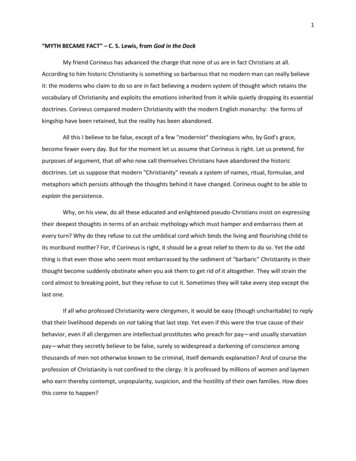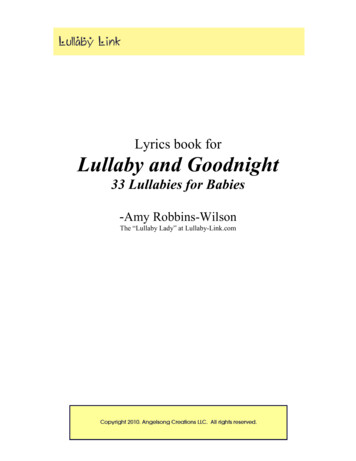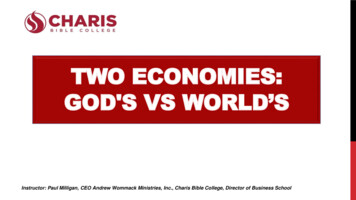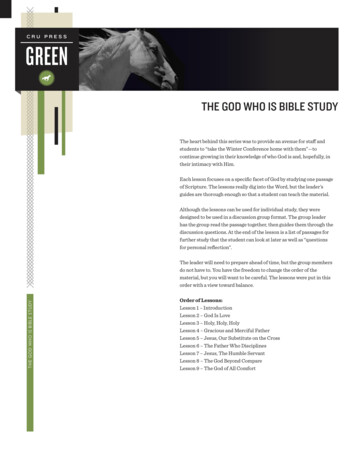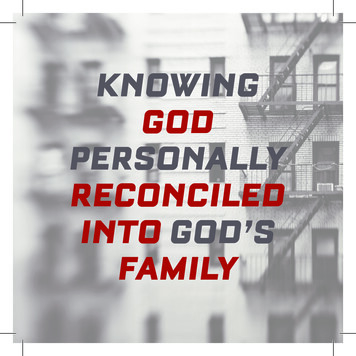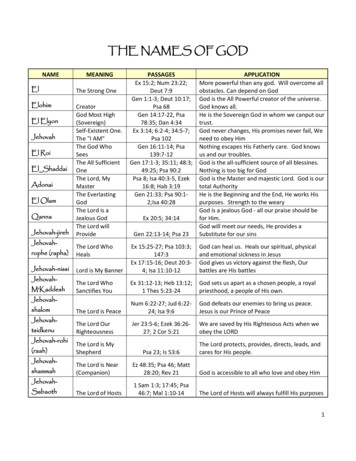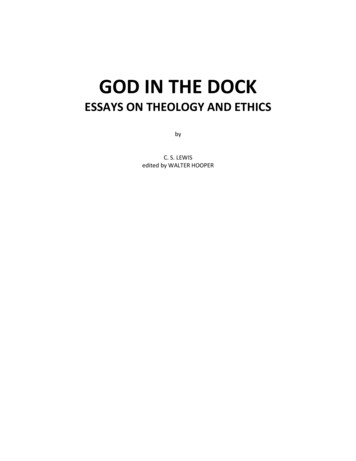
Transcription
GOD IN THE DOCKESSAYS ON THEOLOGY AND ETHICSbyC. S. LEWISedited by WALTER HOOPER
CONTENTSPreface by Walter HooperPART I1 Evil and God2 Miracles3 Dogma and the Universe4 Answers to Questions on Christianity5 Myth Became Fact6 'Horrid Red Things'7 Religion and Science8 The Laws of Nature9 The Grand Miracle10 Christian Apologetics11 Work and Prayer12 Man or Rabbit?13 On the Transmission of Christianity14 'Miserable Offenders'15 The Founding of the Oxford Socratic Club16 Religion without Dogma?17 Some Thoughts18 The Trouble with "X". . .'19 What Are We to Make of Jesus Christ?20 The Pains of Animals21 Is Theism Important?22 Rejoinder to Dr Pittenger23 Must Our Image of God Go?PART II1 Dangers of National Repentance2 Two Ways with the Self3 Meditation on the Third Commandment4 On the Reading of Old Books5 Two Lectures6 Meditation in a Toolshed7 Scraps8 The Decline of Religion9 Vivisection10 Modern Translations of the Bible11 Priestesses in the Church?12 God in the Dock13 Behind the Scenes14 Revival or Decay?15 Before We Can Communicate16 Cross-Examination
PART III1 'Bulverism'2 First and Second Things3 The Sermon and the Lunch4 The Humanitarian Theory of Punishment5 Xmas and Christmas6 What Christmas Means to Me7 Delinquents in the Snow8 Is Progress Possible?9 We Have No 'Right to Happiness'PART IVLetters
PREFACEDr Johnson, speaking of an eighteenth-century theologian, remarked that he 'tended to unsettle everything, and yet settle nothing'.1 I wonder what the robust Doctor would make of our age: an age in whichone sees in most bookshops and Sunday papers the controversial — and, oftentimes, apostate — worksof clergy who 'unsettle' every article of the Faith they are ordained and paid to uphold. It is, partlybecause of this, B pleasure for me to offer as an antidote this new book by C. S. Lewis.I say 'new' because, though these essays and letters were written over a period of twenty-four years,almost all are published in book-form for the first time. Considering how rapidly theological fashionschange, it might be expected that these pieces would already be old stuff. There are, however, I expect,others like myself who are more concerned with whether a book is true than whether it was written lastweek. I believe that Lewis's refusal to compromise, neck or nothing, Heaven or Hell, does not for onemoment detract from their relevance to the basic problems which still assail us.Because of my desire to read everything that Lewis wrote, I undertook the long but happy task of'excavating' his contributions to ephemeral publications. Now, at last, my years of searching librariesand reading faded newsprint are over. But, more important, I anticipate that the majority of them willhave never been seen by most readers, and I hope they will derive as much satisfaction as I do fromhaving them firmly stitched between two boards.Since these new Lewisiana have been culled from such a wide variety of sources, they make, as might beexpected, a very mixed bag. I do not apologize for this because so much of their interest lies in the manydifferent angles from which we are able to view the Christian religion. Lewis never received a penny formost of them. Some of the essays were written simply because he felt the topic badly neededventilating and the healthy position defending; others at the request of a newspaper or a periodical;there are other pieces, such as the ones from The Socratic Digest, which he composed for the purposeof defending the Faith against the attacks of agnostics and atheists.Because Lewis knew how to adapt his material to suit the audience he was writing for, the essays differboth in length and in emphasis. Nevertheless, all share a particular seriousness. Not 'gloominess', forthey sparkle with wit and common sense; but 'seriousness' because of the high stakes which Lewisbelieved were involved in being a man — a possible son of God or a possible candidate for hell.During his years as an agnostic, Lewis wanted to know the answers to such questions as why God allowspain, why Christianity — out of all other religions — was held to be the true one, why and if miraclesactually happen. As a result, he quite naturally anticipated the questions other men ask. After hisconversion in 1931, Lewis, who seldom refused an invitation to speak or write about the Faith, foundhimself moving in very different circles. He preached to and argued with fellow dons, industrial workers,members of the Royal Air Force, and university students. It was partly due to this varied experience thathe came to see why the professional theologians could not make Christianity understandable to mostpeople. As a result, he set himself the task of 'translating' the Gospel into language which men use andunderstand. He believed that if you found it difficult to answer questions from men of different trades itwas probably because 'You haven't really thought it out; not to the end; not to "the absolute ruddyend".'There were many Christians in Oxford in the early 1940s who, like Lewis, felt that both the pros and thecons of the Christian religion should be discussed openly. This led to the foundation of the Socratic Clubin 1941. Lewis was the obvious person for the presidency, a position he held until he went to Cambridgein 1954. Meetings were (and still are) held every Monday evening in Term. One Monday a Christianwould read a paper, to be answered by an unbeliever, and (he following Monday an agnostic or atheist
would read a paper which was, in turn, answered by a Christian. Lewis had always relished 'rationalopposition', and the Socratic Club served as the perfect arena for testing the strengths and weaknessesof his apologetics. One example of the kind of paper he read at the Socratic is 'Religion without Dogma?'which he wrote as a reply to Professor H. H. Price's paper on 'The Grounds of Modern Agnosticism'.It was difficult for the most able unbeliever to contend with Lewis's formidable logic and immenselearning in the Socratic Club. On the other hand, we find him, in his articles in The Coventry EveningTelegraph and popular magazines, adapting his language and logic to less educated people. Pieces suchas 'Religion and Science' and 'The Trouble with "X". . .', with their lucidity and apt analogies, haveunmasked many popular fallacies about the supposed opposition between religion and science, andhave led many people to understand what Christianity is about.Regardless of one's education, it is impossible to decide whether Christianity is true or false if you do notknow what it is about. And, just as there were many who were totally ignorant of Christianity whenLewis began to write, so there are many today who do not know what the real issue is. It is foolish topretend. The recent flood of autobiographical explanations why such and such a bishop or parsoncannot accept the Christian Faith has, I expect, driven many people into deeper ignorance and also(perhaps) into the despairing belief that it could not be understood however hard one tried.For Lewis, who believed that to be born meant either an eventual surrender to God or an everlastingdivorce from Him, this was a serious matter. One day he and I were speculating as to what wouldhappen if a group of friendly and inquisitive Martians suddenly appeared in the middle of Oxford andasked (those who did not flee) what Christianity is. We wondered how many people, apart from voicingtheir prejudices about the Church, could supply them with much in the way of accurate information. Onthe whole, we doubted whether the Martians would take back to their world much that is worth having.On the other hand, 'there is nothing', Lewis argued, 'in the nature of the younger generation whichincapacitates them for receiving Christianity'. But, as he goes on to say, 'no generation can bequeath toits successors what it has not got.':What it has not got. The question as to why it has not got it is, obviously, too complex for me to answer.Nevertheless, having been a college chaplain for five years, I can see that much of the ignorance today isrightly attributed by Lewis to 'the liberal writers who are continually accommodating and whittling downthe truth of the Gospel'. And what Lewis would most emphatically not do is 'whittle down'.He believed that, regardless of the temporary fashions which our ideas about God and morality passthrough, there is nothing which can make the Everlasting Gospel out of date. ('All that is not eternal iseternally out of date.') On the other hand, he believed that our methods of getting the truth across mustoften vary. Indeed, his own methods vary considerably: but he nowhere attempts to empty God outwith the bath-water. For instance, we have from Lewis's pen straightforward apolo-getical works such asMere Christianity and The Problem of Pain, theological satires such as The Screwtape Letters and TheGreat Divorce, and (for lack of a better word) his 'concealed' Christianity in the interplanetary novels andthe Chronicles of Narnia.Though Lewis's methods are not acceptable to liberal theologians (see, for example, his 'Rejoinder to DrPittenger'), he has probably got more orthodox Christianity into more heads than any religious writersince G. K. Chesterton. His graceful prose, his easy conversational style (almost all his books are writtenin the first person), his striking metaphors, and love of clarity are, no doubt, chiefly the result of his widereading, his delight in writing, and his large share of mother wit. But they are more closely related thanthose who have read only his theological books might imagine to his abilities as a literary critic.Beginning with his literary criticism and going on to his theological works, one will probably find that theprocess works the other way round as well. However, the point I particularly want to emphasize is this.Lewis believed that the proper work of a literary critic is to write about the merits and faults of a book,rather than to speculate about the genesis of the book or the author's private life. Though he had a highregard for textual criticism (and lectured on it at one time), he never overlooked the obvious in favour of
the hypothetical. Similarly, in his theological works Lewis (who never claimed to be more than a laymanwriting for other laymen) does not offer ingenious guesses about whether, say, such and such a passagein one of the Gospels was supplied by the early Church long after that Gospel was written, but what theGospels as we have them do, in fact, say and mean.The essays in this book which are more or less 'straight' theology fall into two groups. The first containsthose in which the primary topic is miracles. Lewis maintained that the Faith stripped of its supernaturalelements could not conceivably be called Christianity. Because the miraculous is too toned down orhushed up today, I feel that his essays on the miraculous are particularly ripe for publication. Thoughmost of what he says about miracles and the self-refutation of Naturalists can be found in his full-lengthbook on Miracles (London, 1947; revised, 1960), I believe that the short essays here could have oneadvantage over the book. They might appeal to readers who have not the leisure to read, or who mightget bogged down in, longer works.The second category is hinted at in the title of this book. 'The ancient man', Lewis wrote, 'approachedGod (or even the gods) as the accused person approaches his judge. For the modern man the roles arereversed. He is the judge: God is in the dock.' It would be ridiculous to suppose we can easily put manback in the dock. Lewis discusses his own methods for attempting this in his essay on 'ChristianApologetics' (the only essay in this volume which has never been published in any form before). 'In myexperience', he says in this essay, 'if one begins from the sin that has been one's chief problem duringthe last week, one is very often surprised at the way this shaft goes home.' Those who have readScrewtape will recall numerous instances in which he pinpoints those (seemingly) small sins which, ifallowed to grow unchecked, in the end dominate man. As for the essays that follow, I should besurprised if those who read 'The Trouble with "X". . .' do not have the sensation (which I do) of seeingtheir reflection in a mirror.Lewis struck me as the most thoroughly converted man I ever met. Christianity was never for him aseparate department of life; not what he did with his solitude; 'not even', as he says in one essay, 'whatGod does with His solitude'. His whole vision of life was such that the natural and the supernaturalseemed inseparably combined. Because of this, I have included in this collection his numerous semitheological essays on topics such as the proposed ordination of women and vivisection. There are also anumber of essays such as 'The Humanitarian Theory of Punishment' which could more properly be calledethical. Lastly, because of my concern that nothing be lost, I have added to the back of this book allLewis's letters on theology and ethics that have appeared in newspapers and magazines.The absence of moral values is so acutely felt today that it would seem a pity not to make publicwhatever help is available to our confused and spiritually-starved world. There may be contemporarywriters who strike us as more humane, tender, 'original' and up to date than Lewis. But, like the ThreeLittle Pigs, we need, not straw, but firm brick houses. Those who are concerned about the cheap religionand shoddy values so typical of our times will be aware of our immediate need for the antidote whichLewis provides: his realism, his moral rectitude, his ability to see beyond the partial perspectives whichlimit so many existentialists.It will be noticed that I have, in the footnotes, given the sources of many of the quotations including thebiblical ones. This will, perhaps, seem pedantic to some readers. I may have been at fault, but I hopethat there will be some who might be as grateful to have them as I was to find them. I have alsoprovided in the footnotes translations of the more difficult Latin phrases. This book was prepared withAmerican as well as English readers in mind, and I have included in my footnotes relevant informationwhich is not, I believe, as generally known in the United States as it is here. In order that my notes maybe easily distinguished from the author's, I have used for Lewis's and arabic numerals for mine. Thosewho compare the texts of the essays published here with their originals will discover, in a few instances,some minor changes. This is because I have Lewis's own published copies of some essays, and where he
has made changes or corrections I have followed his emendations. I have also felt it my responsibility tocorrect obvious errors wherever I have found them.Though these essays do not fall easily into neat sub-divisions, I have, nevertheless, felt that divisions ofsome sort would be helpful to the reader. I have, therefore, divided the essays into three parts,conscious while doing so that some of the essays would fit almost as well in one part as they would inanother. Part I contains those essays which are clearly theological: Part II contains those which I termsemi-theological, and Part III includes those in which the basic theme is ethics. Part IV is composed ofLewis's letters arranged in the chronological order in which they were published.I am very grateful to the publishers who have allowed me to reprint these essays and letters. I hope theywill not think me ungenerous and slovenly if, instead of listing them separately, I acknowledge theirpermission by citing the original sources of the essays in the list that follows. The sources of the lettersare found in Part IV. It is to be understood that all the publishers are English except where I have statedotherwise.Finally, as on many previous occasions, I would like to thank Major W. H. Lewis, Mr Owen Barfield, MrColin Hardie, Mr Roger Lancelyn Green, Professor John Lawlor and Miss Nan Dunbar for the assistancethey have given me in making these Lewis 'excavations' available to others.Jesus College, Oxford May 1970Walter Hooper
PART I
1. EVIL AND GODDr Joad's article on 'God and Evil' last week1 sug-gests the interesting conclusion that since neither'mechanism' nor 'emergent evolution' will hold water, we must choose in the long run between somemonotheistic philosophy, like the Christian, and some such dualism as that of the Zoroastrians. I agreewith Dr Joad in rejecting mechanism and emergent evolution. Mechanism, like all materialist systems,breaks down at the problem of knowledge. If thought is the undesigned and irrelevant product ofcerebral motions, what reason have we to trust it? As for emergent evolution, if anyone insists on usingthe word God to mean 'whatever the universe happens to be going to do next', of course we cannotprevent him. But nobody would in fact so use it unless he had a secret belief that what is coming nextwill be an improvement. Such a belief, besides being unwarranted, presents peculiar difficulties to anemergent evolutionist. If things can improve, this means that there must be some absolute standard ofgood above and outside the cosmic process to which that process can approximate. There is no sense intalking of 'becoming better' if better means simply 'what we are becoming' — it is like congratulatingyourself on reaching your destination and defining destination as 'the place you have reached'.Mellontolatry, or the worship of the future, is a fuddled religion.We are left then to choose between monotheism and dualism — between a single, good, almightysource of being, and two equal, uncreated, antagonistic Powers, one good and the other bad. Dr Joadsuggests that the latter view stands to gain from the 'new urgency' of the fact of evil. But what newurgency? Evil may seem more urgent to us than it did to the Victorian philosophers — favouredmembers of the happiest class in the happiest country in the world at the world's happiest period. But itis no more urgent for us than for the great majority of monotheists all down the ages. The classicexpositions of the doctrine that the world's miseries are compatible with its creation and guidance by awholly good Being come from Boethius waiting in prison to be beaten to death and from St Augustinemeditating on the sack of Rome. The present state of the world is normal; it was the last century thatwas the abnormality.This drives us to ask why so many generations rejected Dualism. Not, assuredly, because they wereunfamiliar with suffering; and not because its obvious prima facie plausibility escaped them. It is morelikely that they saw its two fatal difficulties, the one metaphysical, and the other moral.The metaphysical difficulty is this. The two Powers, the good and the evil, do not explain each other.Neither Ormuzd nor Ahriman can claim to be the Ultimate. More ultimate than either of them is theinexplicable fact of their being there together. Neither of them chose this tete-a-tete. Each of them,therefore, is conditioned — finds himself willy-nilly in a situation; and either that situation itself, orsome unknown force which produced that situation, is the real Ultimate. Dualism has not yet reachedthe ground of being. You cannot accept two conditioned and mutually independent beings as the selfgrounded, self-comprehending Absolute. On the level of picture-thinking this difficulty is symbolised byour inability to think of Ormuzd and Ahriman without smuggling in the idea of a common space in whichthey can be together and thus confessing that we are not yet dealing with the source of the universe butonly with two members contained in it. Dualism is a truncated metaphysic.The moral difficulty is that Dualism gives evil a positive, substantive, self-consistent nature, like that ofgood. If this were true, if Ahriman existed in his own right no less than Ormuzd, what could we mean bycalling Ormuzd good except that we happened to prefer him. In what sense can the one party be said tobe right and the other wrong? If evil has the same kind of reality as good, the same autonomy andcompleteness, our allegiance to good becomes the arbitrarily chosen loyalty of a partisan. A soundtheory of value demands something different. It demands that good should be original and evil a mereperversion; that good should be the tree and evil the ivy; that good should be able to see all round evil(as when sane men understand lunacy) while evil cannot retaliate in kind; that good should be able to
exist on its own while evil requires the good on which it is parasitic in order to continue its parasiticexistence.The consequences of neglecting this are serious. It means believing that bad men like badness as such,in the same way in which good men like goodness. At first this denial of any common nature between usand our enemies seems gratifying. We call them fiends and feel that we need not forgive them. But, inreality, along with the power to forgive, we have lost the power to condemn. If a taste for cruelty and ataste for kindness were equally ultimate and basic, by what common standard could the one reprovethe other? In reality, cruelty does not come from desiring evil as such, but from perverted sexuality,inordinate resentment, or lawless ambition and avarice. That is precisely why it can be judged andcondemned from the standpoint of innocent sexuality, righteous anger, and ordinate acquisitiveness.The master can correct a boy's sums because they are blunders in arithmetic — in the same arithmeticwhich he does and does better. If they were not even attempts at arithmetic — if they were not in thearithmetical world at all — they could not be arithmetical mistakes.Good and evil, then, are not on all fours. Badness is not even bad in the same way in which goodness isgood. Ormuzd and Ahriman cannot be equals. In the long run, Ormuzd must be original and Ahrimanderivative. The first hazy idea of devil must, if we begin to think, be analysed into the more precise ideasof 'fallen' and 'rebel' angel. But only in the long run. Christianity can go much further with the Dualistthan Dr Joad's article seems to suggest. There was never any question of tracing all evil to man; in fact,the New Testament has a good deal more to say about dark superhuman powers than about the fall ofAdam. As far as this world is concerned, a Christian can share most of the Zoroastrian outlook; we all livebetween the 'fell, incensed points' of Michael and Satan. The difference between the Christian and theDualist is that the Christian thinks one stage further and sees that if Michael is really in the right andSatan really in the wrong this must mean that they stand in two different relations to somebody orsomething far further back, to the ultimate ground of reality itself. All this, of course, has been watereddown in modern times by the theologians who are afraid of 'mythology', but those who are prepared toreinstate Ormuzd and Ahriman are presumably not squeamish on that score.Dualism can be a manly creed. In the Norse form ('The giants will beat the gods in the end, but I am onthe side of the gods') it is nobler by many degrees than most philosophies of the moment. But it is only ahalf-way house. Thinking along these lines you can avoid Monotheism, and remain a Dualist, only byrefusing to follow your thoughts home. To revive Dualism would be a real step backwards and a badomen (though not the worst possible) for civilization.
2. MIRACLESI HAVE KNOWN ONLY ONE PERSON IN MY LIFE WHO claimed to have seen a ghost. It was awoman; and the interesting thing is that she disbelieved in the immortality of the soul before seeing theghost and still disbelieves after having seen it. She thinks it was a hallucination. In other words, seeing isnot believing. This is the first thing to get clear in talking about miracles. Whatever experiences we mayhave, we shall not regard them as miraculous if we already hold a philosophy which excludes thesupernatural. Any event which is claimed as a miracle is, in the last resort, an experience received fromthe senses; and the senses are not infallible. We can always say we have been the victims of an illusion;if we disbelieve in the supernatural this is what we always shall say. Hence, whether miracles have reallyceased or not, they would certainly appear to cease in Western Europe as materialism became thepopular creed. For let us make no mistake. If the end of the world appeared in all the literal trappings ofthe Apocalypse,1 if the modern materialist saw with his own eyes the heavens rolled up2 and the greatwhite throne appearing,3 if he had the sensation of being himself hurled into the Lake of Fire,4 he wouldcontinue forever, in that lake itself, to regard his experience as an illusion and to find the explanation ofit in psychoanalysis, or cerebral pathology. Experience by itself proves nothing. If a man doubts whetherhe is dreaming or waking, no experiment can solve his doubt, since every experiment may itself be partof the dream. Experience proves this, or that, or nothing, according to the preconceptions we bring to it.This fact, that the interpretation of experiences depends on preconceptions, is often used as anargument against miracles. It is said that our ancestors, taking the supernatural for granted and greedyof wonders, read the miraculous into events that were really not miracles. And in a sense I grant it. Thatis to say, I think that just as our preconceptions would prevent us from apprehending miracles if theyreally occurred, so their preconceptions would lead them to imagine miracles even if they did not occur.In the same way, the doting man will think his wife faithful when she is not and the suspicious man willnot think her faithful when she is: the question of her actual fidelity remains, meanwhile, to be settled, ifat all, on other grounds. But there is one thing often said about our ancestors we must not say. We mustnot say "They believed in miracles because they did not know the Laws of Nature." This is nonsense.When St. Joseph discovered that his bride was pregnant, he was "minded to put her away."5 He knewenough biology for that. Otherwise, of course he would not have regarded pregnancy as a proof ofinfidelity. When he accepted the Christian explanation, he regarded it as a miracle precisely because heknew enough of the Laws of Nature to know that this was a suspension of them. When the disciples sawChrist walking on the water they were frightened:6 they would not have been frightened unless theyhad known the Laws of Nature and known that this was an exception. If a man had no conception of aregular order in Nature, then of course he could not notice departures from that order: just as a duncewho does not understand the normal meter of a poem is also unconscious of the poet's Variations fromit. Nothing is wonderful except the abnormal and nothing is abnormal until we have grasped the norm.Complete ignorance of the Laws of Nature would preclude the perception of the miraculous just asrigidly as complete disbelief in the supernatural precludes it, perhaps even more so. For while thematerialist would have at least to explain miracles away, the man wholly ignorant of Nature wouldsimply not notice them.The experience of a miracle in fact requires two conditions. First, we must believe in a normal stabilityof Nature, which means we must recognize that the data offered by our senses recur in regular patterns.Secondly, we must believe in some reality beyond Nature. When both beliefs are held, and not till then,we can approach with an open mind the various reports which claim that this super- or extra-naturalreality has sometimes invaded and disturbed the sensuous content of space and time which makes our
"natural" world. The belief in such a supernatural reality itself can neither be proved nor disproved byexperience. The arguments for its existence are metaphysical, and to me conclusive. They turn on thefact that even to think and act in the natural world we have to assume something beyond it and evenassume that we partly belong to that something. In order to think we must claim for our own reasoninga validity which is not credible if our own thought is merely a function of our brain, and our brains a byproduct of irrational physical processes. In order to act, above the level of mere impulse, we must claima similar validity for our judgments of good and evil. In both cases we get the same disquieting result.The concept of Nature itself is one we have reached only tacitly by claiming a sort of super-naturalstatus for ourselves.If we frankly accept this position and then turn to the evidence, we find, of course, that accounts ofthe supernatural meet us on every side. History is full of them—often in the same documents which weaccept wherever they do not report miracles. Respectable missionaries report them not infrequently.The whole Church of Rome claims their continued occurrence. Intimate conversation elicits from almostevery acquaintance at least one episode in his life which is what he would call "queer" or "rum." Nodoubt most stories of miracles are unreliable; but then, as anyone can see by reading the papers, so aremost stories of all events. Each story must be taken on its merits: what one must not do is to rule outthe supernatural as the one impossible explanation. Thus you may disbelieve in the Mons Angels7because you cannot find a sufficient number of sensible people who say they saw them. But if you founda sufficient number, it would, in my view, be unreasonable to explain this by collective hallucination. Forwe know enough of psychology to know that spontaneous unanimity in hallucination is very improbable,and we do not know enough of the supernatural to know that a manifestation of angels is equallyimprobable. The supernatural theory is the less improbable of the two. When the Old Te
Mere Christianity and The Problem of Pain, theological satires such as The Screwtape Letters and The Great Divorce, and (for lack of a better word) his 'concealed' Christianity in the interplanetary novels and the Chronicles of Narnia. Though Lewis's methods are not acceptable to li


